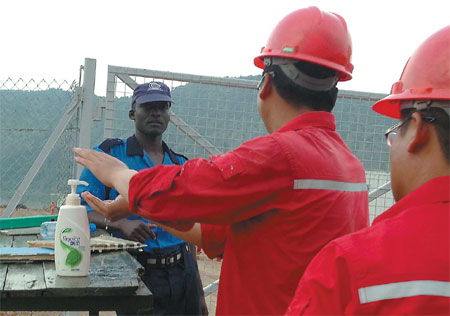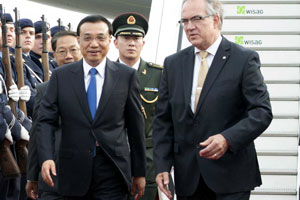China rushes help to Ebola-hit countries
By Joseph Catanzaro and Chen Yingqun (China Daily Africa) Updated: 2014-10-24 07:27
|
Workers disinfect their hands at a Sinopec oil drilling operation in Uganda to prevent the danger of infection. Provided to China Daily |
To date, the couple have raised $300,000 through their charitable organization, the Queennak Foundation.
"Many Chinese people have been very helpful," Yang says. "We have launched several events, with friends donating paintings we can auction, and others volunteering to help with the organization. My husband and I auctioned some paintings. Some big companies, such as China Mobile, have also been very supportive and donated money. The money we have raised has paid for thermometers, masks and protective clothing."
The foundation has also donated 300 bags of rice, 100 dozen bottles of antiseptic liquid, 200 20-liter cans of cooking oil, 50 cartons of noodles and 100 cartons of soap that have been distributed to Ebola-ravaged countries.
In August the epidemic accelerated, and the first known cases of infected US, British and Spanish citizens were reported. The Democratic Republic of Congo and Senegal logged their first cases. The WHO declared that the epidemic had gone from being an African problem to an "international public health emergency" and put the total death toll at more than 1,000, then raised it to more than 1,550 within weeks, prompting the organization to warn that as many as 20,000 people may be infected before the crisis is contained.
At the highest levels in China, decisions were being made. On Aug 7, Beijing said it would provide 30 million yuan in aid to Liberia, Sierra Leone and Guinea to help combat the effects of the outbreak.
It was welcome news for concerned Africans in China.
"Ebola is not only in Africa now," Kargbo says. "It's out of Africa, it's out in the world and its the world's problem."
Cao Guang, a member of a rotating team of medics that China has been stationing in Guinea since the late 1960s, was cleared of infection in August after doing his part to fight what he calls the war on Ebola. He had touched a patient's eyelids with his bare hands during treatment. Unlike some other countries, China said the 38-person medical team would not be evacuated, but would instead stay to help.
On Aug 13, Chinese medical supplies arrived in Monrovia followed closely by another three Chinese medical teams dispatched across West Africa to help with prevention and treatment.
The perils they face are clear. Of the thousands who have contracted Ebola, 443 have been healthcare workers, and 244 of them have died.
The Chinese medical teams are the product of a national health system that has felt the brunt of a deadly viral outbreak and learned from it, He says.
"SARS made China react sensitively to Ebola," he says. "That is, we know we need to pay attention to it and give it the proper emphasis.
"I think after SARS, our tolerance for viruses and diseases is lower than that of other countries. We do not underestimate these things because we remember the tragedy here. Our health system now has good testing equipment and good front-line medical workers. Since SARS, we have focused on giving our people front-line training and worked on improving their skills. The experience SARS provided is what we are using to help Africa."
By last month, the number of Chinese medical workers dispatched to West Africa had reached more than 170.
In late September, with the death toll climbing to 3,091 dead of 6,574 probable, suspected and confirmed cases, the US Centers for Disease Control and Prevention came out with a worst-case scenario that estimated between 550,000 and 1.4 million people in West Africa could be infected by January.
The United States and Britain pledged more aid and manpower to help, and China's Foreign Minister, Wang Yi, reiterated China would continue to stand with Africa in the fight against Ebola.
- DPRK to bar foreign tourists to prevent Ebola virus
- WHO calls for screening measures against Ebola spread
- New York doctor tests positive for Ebola
- NYC hospital testing doctor for Ebola virus
- UN calls on Chinese businesses to help fight Ebola
- China rushes help to Ebola-hit countries
- US to track everyone from Ebola nations











